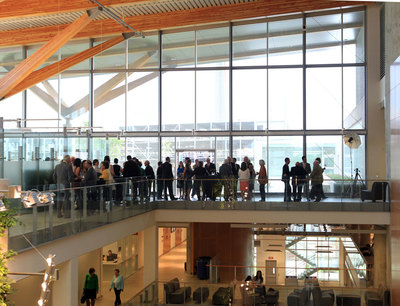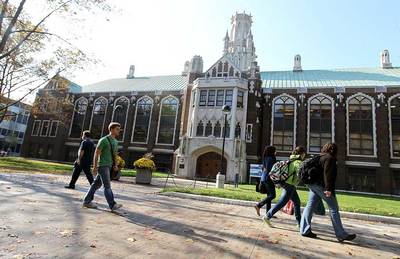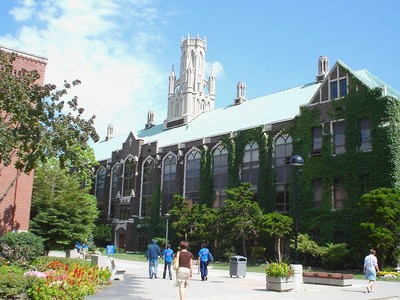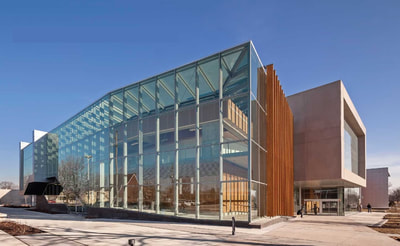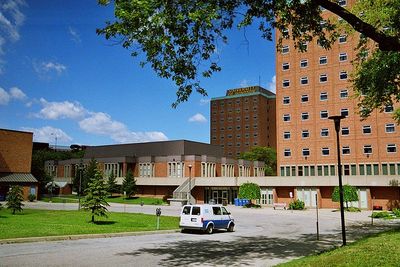สถาบัน University of Windsor
โปรแกรม Mechanical Engineering
Ph.D.; M.A.Sc.; M.Eng.
(เมือง Windsor, รัฐ Ontario)
About University of Windsor
มหาวิทยาลัยวินเซอร์เป็นมหาวิทยาลัยรัฐชั้นนำของประเทศแคนาดา ได้ถูกก่อตั้งในปี 1857 ในนาม Assumption College และ ได้ก่อตั้งเป็นมหาวิทยาลัยวินเซอร์ในปี 1962
- สถาบันตั้งอยู่ใจกลางเมืองวินเซอร์
- เพียง 3 ชั่วโมงจากเมืองโตรอนโต้
- สถาบันติดกับแม่น้ำ Detriot River และ เขตเมือง Windsor Detriot Metropolitan area เพียงข้ามสะพานจะถึงประเทศสหรัฐอเมริกา ถือว่าที่ตั้งเหมาะเป็นอย่างยิ่งสำหรับท่านที่สนใจที่จะศึกษา พร้อมหาประสบการณ์ในประเทศแคนาดา และ สหรัฐอเมริกา
Why choose University of Windsor?
- มหาวิทยาลัยวินเซอร์มีชื่อเสียง และ คุณภาพการศึกษาดีเยี่ยม (High Academic Excellence)
- คณาจารย์ และ นักศึกษามาจากทั่วโลก (Truly international)
- หลากหลายโปรแกรมที่น่าสนใจในระดับ ปริญญาตรี ปริญญาโท และ ปริญญาเอก
- หลากหลายสาขาการเรียน
- ได้สัมผัสทั้งประเทศแคนาดา และ ประเทศอเมริกา ซึ่งห่างเพียงไม่กี่นาทีข้ามสะพาน Ambassador bridge (Enjoy the best of both worlds, Canada & USA)
- สามารถทำงานระหว่างเรียนได้ 20 hours/ week
- สามารถทำงานหลังเรียนจบอย่างถูกต้องตามกฎหมาย
About Mechanical Engineering Ph.D.; M.A.Sc.; M.Eng.
The Mechanical Engineering graduate program is committed to advancing knowledge by conducting leading-edge research that involves practical training in the fields related to mechanical engineering fundamentals.
Graduate Program Objectives
The objectives of our graduate programs in Mechanical Engineering are to refine and extend students' capabilities for handling engineering research projects and to provide the industrial community with graduates who have technologically relevant knowledge. These objectives are achieved through course work, teaching and research seminars, major research papers and theses.
Doctor of Philosophy (PhD)
An applicant for admission to a course of graduate studies leading to the PhD degree in engineering must normally be a graduate of a recognized university with a research-based master's degree in engineering or applied science. Applicants with degrees in related fields will be considered but will normally require strengthening of their background in engineering. At the discretion of the Program Graduate Committee, Graduate Record Examinations (GRE) may be required.
Master of Applied Science (MASc)
The MASc is a research-based program in which you will complete four graduate level courses and a thesis. You will need an advisor and will conduct research under your advisor’s supervision. Students working under a professor’s supervision may be paid. This program is designed to be completed in two years. Scholarships and graduate assistantships are available by application. Continuation of your education at the PhD level is possible with this degree.
Master of Engineering (MEng)
The MEng is a course-based program in which you can complete eight graduate level courses in one year or five terms, including five from your area of specialization plus one more engineering course (from any department), and no more than two non-engineering courses. Alternatively, you may choose to complete all eight courses within your area of specialization. No funding or scholarships are available. This is considered a terminal degree meaning that you cannot go into a PhD program with this degree. No supervisor is required.
Areas of Specialization
At the MASc level, programs are offered in the areas of:
- Aerospace
- Automotive
- Machine dynamics and design
- Metal forming
- Noise and vibration (NVH)
- Thermofluids
At the PhD level, programs are offered in the areas of:
- Aerospace
- Automotive
- Machine dynamics and design
- Metal forming
- Noise and vibration (NVH)
- Thermofluids
Courses:
92-503. Turbulent Flow
General turbulence theories, wall turbulence and free turbulence. (3 lecture hours a week.)
92-506. Thermal Systems Design
Advanced systems design requiring the application of economics, heat transfer, simulation and optimization. (3 lecture hours a week.)
92-507. Experimental Techniques in Flow Measurements
A course covering the theory of flow and velocity measurement. Emphasis will be placed on hot wire instruments and turbulence measurements. (3 lecture hours a week.)
92-509. Multiphase, Multicomponent Flows
A thorough treatment of the basic techniques for analyzing one-dimensional multi-phase, multicomponent flows in order to predict flow regimes, pressure drop, etc. Practical applications in fluidization, sedimentation and boiling heat transfer. (3 lecture hours a week.)
92-516. Industrial and Motor Vehicle Noise
Hearing damage risk criteria and in-plant noise regulations; determination of permissible exposure levels due to continuous and intermittent noise. Measurement of machine noise and standard procedures. Fundamentals of noise control. Characteristics and levels of motor vehicle and traffic noise; motor vehicle noise control legislation and standard procedures for measurement. (3 lecture hours a week.)
92-517. Automotive Applications for Noise, Vibration and Harshness Evaluation
This course introduces the automotive applications and tools for the evaluation of noise, vibration and harshness. It includes reviews of measurement techniques presently used in the automotive industry to measure various aspects of noise, including the concept of sound quality, vibration and the quantification of the term harshness. The course consists of a review of papers which are to be presented to the class. Participants perform critical reviews on the presentations. Three lecture hours per week. Course evaluation is based on weekly reports, presentations of reviews of papers and critical reviews by participants. (3 lecture hours a week.)
92-530. Combustion Engineering
An introductory graduate course on combustion engineering, covering a broad range of topics of importance to the field including chemical thermodynamics and kinetics, flames and combustion rates, and detonation of gaseous mixtures. The emphasis is on the understanding of the combustion processes involved in practical systems. (Antirequisite: 92-590-01.) (3 lecture hours a week.)
92-531. Numerical Heat Transfer and Fluid Flow
This course is concerned with the ability of using numerical methods to predict heat transfer, fluid flow and related processes. The course consists of an introduction to Computational Fluid Dynamics, descriptions of the general governing differential equations, discretization methods for the differential equations, numerical simulation of conductive heat transfer, numerical treatment of convection and diffusion and calculations of flow fields. (Antirequisite: 92-590-02.) (3 lecture hours a week.)
92-532. Modeling of Thermo-fluid Systems
This course will cover the basic types of mathematical models that are used to describe Thermo-fluid systems. Lumped as well as distributed parameter models will be considered with analytical as well as numerical methods of solution. Modern solution tools such as Simulink, Maple, Fluent and Wave will be utilized whenever appropriate. The topics to be considered may include but are not limited to: two-phase flow, transient flow, turbulence, non-newtonian flow, boiling, evaporation, condensation and fluid-structure interaction. (Antirequisite: 92-590-07.) (3 lecture hours a week.)
92-533. Turbulent Reacting Flows
This course will cover the following topics: experimental investigation of flames, thermodynamics of combustion processes, transport phenomena, chemical kinetics, reactions mechanism, laminar premixed and diffusion flames, the Navier-Stokes equations for the reacting flows, turbulent premixed and non-premixed flames, low temperature oxidation and engine knock, and pollutants formation. (Antirequisite: 92-590-08.) (3 lecture hours a week.)
92-534. Introduction to Computational Fluid Dynamics
This course is intended to provide basic knowledge required to initiate research or applications in computational fluid dynamics. Topics include: numerical methods for model hyperbolic, parabolic and elliptic equations; analysis of difference schemes; numerical stability; explicit and implicit methods; artificial viscosity; linearization techniques; approximate factorization; preconditioning, iterative solutions, successive over-relaxation (SOR), successive line over-relaxation (SLOR), alternating direction implicit (ADI); two-dimensional structured grid generation; introduction to finite volume method. (Antirequisite: 62-577.) (3 lecture hours a week.)
92-535. Advanced Topics in Computational Fluid Dynamics
This course is a continuation of 92-534. Advanced topics in computational fluid dynamics (CFD) will be discussed, including: structured and unstructured grid generation on surfaces and three-dimensional; Navier-Stokes and Euler solvers; applications of finite volume method; turbulence modeling; current issues in CFD. Students will carry out project work using one or more commercial CFD packages.(Prerequisite: 92-534.) (Antirequisite: 62-587.) (3 lecture hours a week.)
92-536. Fundamentals Of Clean Engine Technology
This course focusses on the understanding of fuel properties, combustion processes, exhaust emissions, and pollution prevention in diesel and other lean-burn IC engines. Introduction to Stirling and other external combustion engines.
92-540. Applied Finite Element Analysis
This course focuses on the modeling aspects of the finite element method using three well known commercial Finite Element Analysis (FEA) software packages known as DYNA, IDEAS and ANSYS. A variety of stress analysis problems in two and three dimensions are studied and the accuracy of the simulations are assessed through comparison with available theoretical and experimental results. Both static and dynamic situations are covered. The students are expected to prepare a final report summarizing their work and an oral presentation. (Antirequisite: 92-590-03.) (3 lecture hours a week.)
92-541. Introduction to Vibration Measurement and Modal Analysis
This course is concerned with basic concepts of modal theory, basic modal parameter analysis, single degree of freedom methods, introduction to frequency response functions, general modal analysis and multiple degree of freedom and global methods. The accuracy of Fast Fourier Transforms (FFT) and windowing, FFT analysis options, zoom, coherence and quality assessment, relationship to finite element modeling will also be considered. In addition, basic measurement techniques, calibration techniques, transient and steady state excitation techniques, general frequency response function interpretation, case study (laboratory experiment) and validation of measured and analyzed data are studied. (Antirequisite: 92-590-04) (3 lecture hours a week.)
92-542. Advanced Topics in Mechanical Design
The topics discussed in the course will be selected from the following: design and analysis of mechanical details such as welded and bonded joints, minimum constraint design, fluid power systems, mobile hydraulic systems, project planning, optimization, decision making methodology, ISO/QS9000 quality methods, concurrent engineering, design reports, design reviews, design for manufacture and assembly, design for quality, configuration design, design for minimum cost, parametric design, developing size ranges for families of products, geometric dimensioning and tolerancing, Taguchi methods, manufacturability and serviceability considerations and product warranties. (Antirequisite: 92-590-05.) (3 lecture hours a week.)
92-543. Product Design and Development
This course covers the process of new product creation including topics selected from: the product development team; the product development cycle; conceptual development; models including technology push products; platform products; process-intensive products and customized products; needs analysis - identifying the customer and their needs; establishing product specifications; concept generation; concept selection; product architecture; industrial design and ergonomics; prototyping; economics of the development process and project management. (Antirequisite: 92-590-06.) (3 lecture hours a week.)
92-544. Finite Element Methods for Crashworthiness and Impact Analysis
The topics include a brief history on the use of numerical tools in automotive/impact field, Explicit and Implicit time integration techniques, Shell and Solid finite element formulations for impact analyses - advantages and disadvantages, Zero Energy Modes (Hourglassing) and Hourglass control, Material modeling for large displacement problems, Finite element modeling for contact, Mesh Adaptivity, Arbitrary Lagrangian and Eulerian Meshes for large deformation problems, Use of implicit integration techniques for impact problems, Quasistatic simulations as well as the development of finite element models for impact analyses. (Antirequisite: 92-590-12.) (3 lecture hours a week.)
92-545. Automotive Control Systems
This course will address advanced control design techniques for automotive systems. The interdisciplinary goal of this course is to present the application of control system design to engine operation and vehicle mechanics as well as the approaches for parameter/model identification and estimation of automotive systems. For graduate students in electrical engineering, this course will make it possible for them to access automotive models and to understand engine dynamics, both for the purposes of applying control design techniques. For graduate students in mechanical engineering, this course will provide a chance for them to learn how to apply advanced control design strategies to automotive systems. It is expected that, after taking this course, graduate students from both engineering fields will be able to address automotive control problems from interdisciplinary point of views and to complement expertise in their own areas. (Prerequisite: 92-412.) (Antirequisite: 92-590-22) (Cross-listed with 88-536.) (3 lecture hours a week.)
92-590. Directed Special Studies
A special course of studies with content and direction approved by the student's chief advisor. Although there may not be formal lectures, the course will carry the weight of three lecture hours.
92-593. Introduction to Finite Element Analysis
This course covers the fundamentals of the Finite Element Analysis (FEA) with emphasis on solid mechanics and stress analysis. The subject of finite elements is treated using variational principles such as the principle of virtual work and total potential energy. The course deals with a variety of structural components such as springs, axially loaded bars, beams under bending, two-dimensional/axially symmetric/three-dimensional continuum elements and their formulation is static and dynamic analysis. In addition to three hours of lecture, a two-hour computer lab is mandatory where the students use different commercial FEA software. (Antirequisite: 62-593) (3 lecture hours a week and 2 laboratory hours a week.)
92-595. MASc Graduate Seminar
MASc Graduate Seminar is a series of presentations by graduate students, faculty and invited speakers on engineering related topics, including but not limited to research, development, commercialization, management and leadership. All full-time and part-time MASc students are required to complete 36 hours of graduate seminar classes and give one seminar presentation in the MASc Graduate Seminar course during each of his/her graduate degree programs in Mechanical Engineering. Part-time students who are not able to take the MASc Graduate Seminar course have to take an additional 3-credit graduate course approved by his/her degree supervisor(s), if necessary, to fulfill the overall credit requirement for the degree. This seminar course will be graded on a pass/fail basis. (1 lecture hour/week)
92-695. PhD Graduate Seminar
PhD Graduate Seminar is a series of presentations by graduate students, faculty and invited speakers on engineering related topics, including but not limited to research, development, commercialization, management and leadership. All full-time and part-time PhD students are required to complete 36 hours of graduate seminar classes and give two seminar presentations in the PhD Graduate Seminar course during each of his/her graduate degree programs in Mechanical Engineering. Part-time students who are not able to take the PhD Graduate Seminar course have to take an additional 3-credit graduate course approved by his/her degree supervisor(s), if necessary, to fulfill the overall credit requirement for the degree. This seminar course will be graded on a pass/fail basis. (1 lecture hour/week)
92-796. Major Paper
92-797. Thesis
92-798. Dissertation
Admission Requirements:
English: one of the following
- TOEFL: 220, IBT-83 for M.A.Sc., Ph.D. 220, IBT-83 for M.Eng.
- IELTS: 6.5
Contact Us
หากน้อง ๆ หรือคุณพ่อคุณแม่มีคำถาม หรือสนใจรับโบรชัวร์ สามารถแจ้งได้ที่
ออฟฟิศแปซิฟิคสาขากรุงเทพฯ
(083) 358-7000, (086) 881-3084, (085) 658-7000
ออฟฟิศแปซิฟิคสาขาแวนคูเวอร์
(778) 995-4763, (604) 716-0478
พี่ ๆ ทีมงานยินดีพร้อมประสานงานและบริการการสมัครวีซ่าประเทศแคนาดาและวีซ่าอเมริกาอย่างครบวงจรค่ะ นอกจากนี้จะมีทีมงานต้อนรับและศูนย์แปซิฟิคสาขาเมืองแวนคูเวอร์ค่ะ


